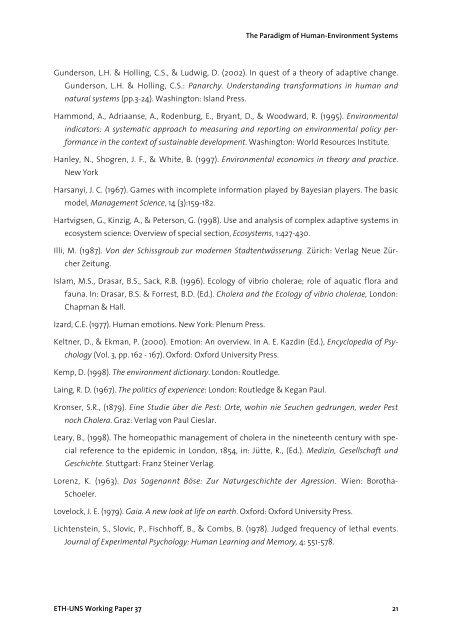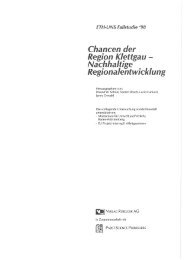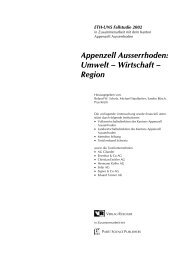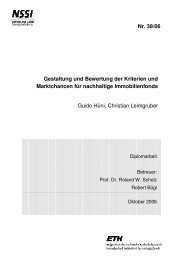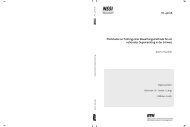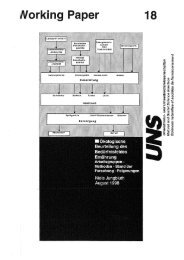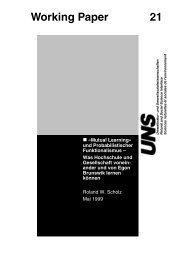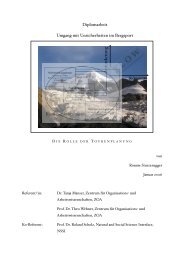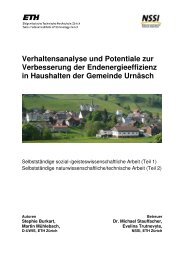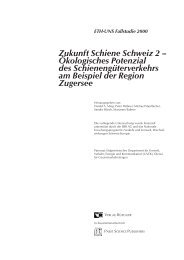The Paradigm of Human-Environment Systems - Natural and Social ...
The Paradigm of Human-Environment Systems - Natural and Social ...
The Paradigm of Human-Environment Systems - Natural and Social ...
You also want an ePaper? Increase the reach of your titles
YUMPU automatically turns print PDFs into web optimized ePapers that Google loves.
<strong>The</strong> <strong>Paradigm</strong> <strong>of</strong> <strong>Human</strong>-<strong>Environment</strong> <strong>Systems</strong><br />
Gunderson, L.H. & Holling, C.S., & Ludwig, D. (2002). In quest <strong>of</strong> a theory <strong>of</strong> adaptive change.<br />
Gunderson, L.H. & Holling, C.S.: Panarchy. Underst<strong>and</strong>ing transformations in human <strong>and</strong><br />
natural systems (pp.3-24). Washington: Isl<strong>and</strong> Press.<br />
Hammond, A., Adriaanse, A., Rodenburg, E., Bryant, D., & Woodward, R. (1995). <strong>Environment</strong>al<br />
indicators: A systematic approach to measuring <strong>and</strong> reporting on environmental policy performance<br />
in the context <strong>of</strong> sustainable development. Washington: World Resources Institute.<br />
Hanley, N., Shogren, J. F., & White, B. (1997). <strong>Environment</strong>al economics in theory <strong>and</strong> practice.<br />
New York<br />
Harsanyi, J. C. (1967). Games with incomplete information played by Bayesian players. <strong>The</strong> basic<br />
model, Management Science, 14 (3):159-182.<br />
Hartvigsen, G., Kinzig, A., & Peterson, G. (1998). Use <strong>and</strong> analysis <strong>of</strong> complex adaptive systems in<br />
ecosystem science: Overview <strong>of</strong> special section, Ecosystems, 1:427-430.<br />
Illi, M. (1987). Von der Schissgroub zur modernen Stadtentwässerung. Zürich: Verlag Neue Zürcher<br />
Zeitung.<br />
Islam, M.S., Drasar, B.S., Sack, R.B. (1996). Ecology <strong>of</strong> vibrio cholerae; role <strong>of</strong> aquatic flora <strong>and</strong><br />
fauna. In: Drasar, B.S. & Forrest, B.D. (Ed.). Cholera <strong>and</strong> the Ecology <strong>of</strong> vibrio cholerae, London:<br />
Chapman & Hall.<br />
Izard, C.E. (1977). <strong>Human</strong> emotions. New York: Plenum Press.<br />
Keltner, D., & Ekman, P. (2000). Emotion: An overview. In A. E. Kazdin (Ed.), Encyclopedia <strong>of</strong> Psychology<br />
(Vol. 3, pp. 162 - 167). Oxford: Oxford University Press.<br />
Kemp, D. (1998). <strong>The</strong> environment dictionary. London: Routledge.<br />
Laing, R. D. (1967). <strong>The</strong> politics <strong>of</strong> experience: London: Routledge & Kegan Paul.<br />
Kronser, S.R., (1879). Eine Studie über die Pest: Orte, wohin nie Seuchen gedrungen, weder Pest<br />
noch Cholera. Graz: Verlag von Paul Cieslar.<br />
Leary, B., (1998). <strong>The</strong> homeopathic management <strong>of</strong> cholera in the nineteenth century with special<br />
reference to the epidemic in London, 1854, in: Jütte, R., (Ed.). Medizin, Gesellschaft und<br />
Geschichte. Stuttgart: Franz Steiner Verlag.<br />
Lorenz, K. (1963). Das Sogenannt Böse: Zur Naturgeschichte der Agression. Wien: Borotha-<br />
Schoeler.<br />
Lovelock, J. E. (1979). Gaia. A new look at life on earth. Oxford: Oxford University Press.<br />
Lichtenstein, S., Slovic, P., Fischh<strong>of</strong>f, B., & Combs, B. (1978). Judged frequency <strong>of</strong> lethal events.<br />
Journal <strong>of</strong> Experimental Psychology: <strong>Human</strong> Learning <strong>and</strong> Memory, 4: 551-578.<br />
ETH-UNS Working Paper 37 21


